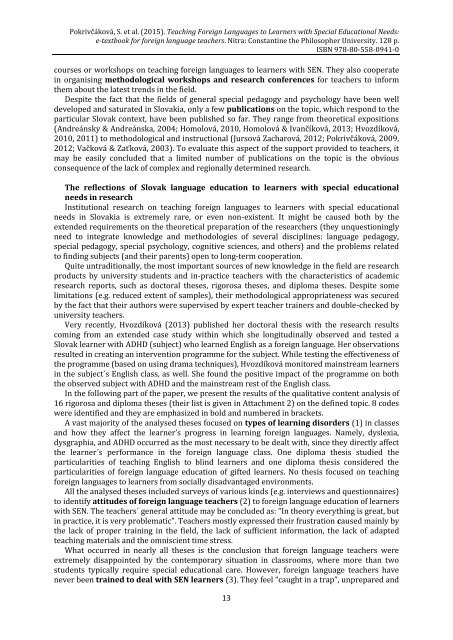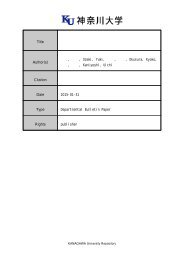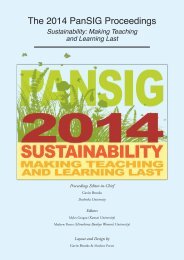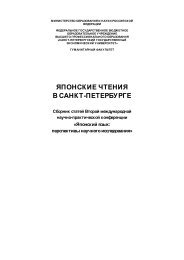to Learners with Special Educational Needs
e-textbook SEN
e-textbook SEN
You also want an ePaper? Increase the reach of your titles
YUMPU automatically turns print PDFs into web optimized ePapers that Google loves.
Pokrivčáková, S. et al. (2015). Teaching Foreign Languages <strong>to</strong> <strong>Learners</strong> <strong>with</strong> <strong>Special</strong> <strong>Educational</strong> <strong>Needs</strong>:<br />
e-textbook for foreign language teachers. Nitra: Constantine the Philosopher University. 128 p.<br />
ISBN 978-80-558-0941-0<br />
courses or workshops on teaching foreign languages <strong>to</strong> learners <strong>with</strong> SEN. They also cooperate<br />
in organising methodological workshops and research conferences for teachers <strong>to</strong> inform<br />
them about the latest trends in the field.<br />
Despite the fact that the fields of general special pedagogy and psychology have been well<br />
developed and saturated in Slovakia, only a few publications on the <strong>to</strong>pic, which respond <strong>to</strong> the<br />
particular Slovak context, have been published so far. They range from theoretical expositions<br />
(Andreánsky & Andreánska, 2004; Homolová, 2010, Homolová & Ivančíková, 2013; Hvozdíková,<br />
2010, 2011) <strong>to</strong> methodological and instructional (Jursová Zacharová, 2012; Pokrivčáková, 2009,<br />
2012; Vačková & Zaťková, 2003). To evaluate this aspect of the support provided <strong>to</strong> teachers, it<br />
may be easily concluded that a limited number of publications on the <strong>to</strong>pic is the obvious<br />
consequence of the lack of complex and regionally determined research.<br />
The reflections of Slovak language education <strong>to</strong> learners <strong>with</strong> special educational<br />
needs in research<br />
Institutional research on teaching foreign languages <strong>to</strong> learners <strong>with</strong> special educational<br />
needs in Slovakia is extremely rare, or even non-existent. It might be caused both by the<br />
extended requirements on the theoretical preparation of the researchers (they unquestioningly<br />
need <strong>to</strong> integrate knowledge and methodologies of several disciplines: language pedagogy,<br />
special pedagogy, special psychology, cognitive sciences, and others) and the problems related<br />
<strong>to</strong> finding subjects (and their parents) open <strong>to</strong> long-term cooperation.<br />
Quite untraditionally, the most important sources of new knowledge in the field are research<br />
products by university students and in-practice teachers <strong>with</strong> the characteristics of academic<br />
research reports, such as doc<strong>to</strong>ral theses, rigorosa theses, and diploma theses. Despite some<br />
limitations (e.g. reduced extent of samples), their methodological appropriateness was secured<br />
by the fact that their authors were supervised by expert teacher trainers and double-checked by<br />
university teachers.<br />
Very recently, Hvozdíková (2013) published her doc<strong>to</strong>ral thesis <strong>with</strong> the research results<br />
coming from an extended case study <strong>with</strong>in which she longitudinally observed and tested a<br />
Slovak learner <strong>with</strong> ADHD (subject) who learned English as a foreign language. Her observations<br />
resulted in creating an intervention programme for the subject. While testing the effectiveness of<br />
the programme (based on using drama techniques), Hvozdíková moni<strong>to</strong>red mainstream learners<br />
in the subject´s English class, as well. She found the positive impact of the programme on both<br />
the observed subject <strong>with</strong> ADHD and the mainstream rest of the English class.<br />
In the following part of the paper, we present the results of the qualitative content analysis of<br />
16 rigorosa and diploma theses (their list is given in Attachment 2) on the defined <strong>to</strong>pic. 8 codes<br />
were identified and they are emphasized in bold and numbered in brackets.<br />
A vast majority of the analysed theses focused on types of learning disorders (1) in classes<br />
and how they affect the learner’s progress in learning foreign languages. Namely, dyslexia,<br />
dysgraphia, and ADHD occurred as the most necessary <strong>to</strong> be dealt <strong>with</strong>, since they directly affect<br />
the learner´s performance in the foreign language class. One diploma thesis studied the<br />
particularities of teaching English <strong>to</strong> blind learners and one diploma thesis considered the<br />
particularities of foreign language education of gifted learners. No thesis focused on teaching<br />
foreign languages <strong>to</strong> learners from socially disadvantaged environments.<br />
All the analysed theses included surveys of various kinds (e.g. interviews and questionnaires)<br />
<strong>to</strong> identify attitudes of foreign language teachers (2) <strong>to</strong> foreign language education of learners<br />
<strong>with</strong> SEN. The teachers´ general attitude may be concluded as: “In theory everything is great, but<br />
in practice, it is very problematic”. Teachers mostly expressed their frustration caused mainly by<br />
the lack of proper training in the field, the lack of sufficient information, the lack of adapted<br />
teaching materials and the omniscient time stress.<br />
What occurred in nearly all theses is the conclusion that foreign language teachers were<br />
extremely disappointed by the contemporary situation in classrooms, where more than two<br />
students typically require special educational care. However, foreign language teachers have<br />
never been trained <strong>to</strong> deal <strong>with</strong> SEN learners (3). They feel “caught in a trap”, unprepared and<br />
13






